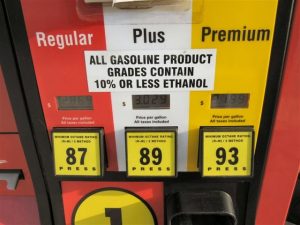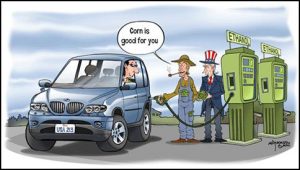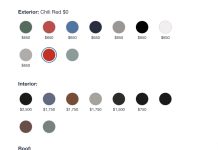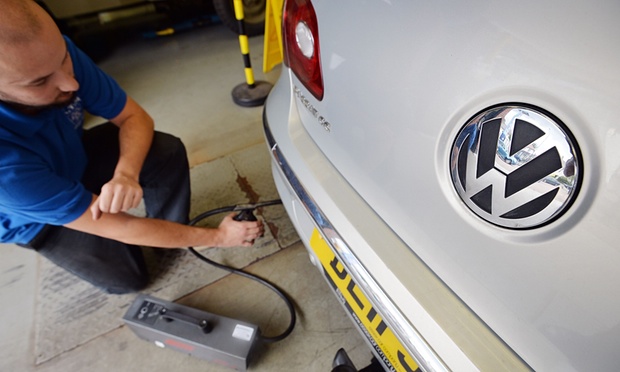Imagine if the cup of coffee you just bought contained 10 percent not-coffee. Imagine if you weren’t allowed to buy 100 percent coffee – because Starbucks was forced by federal fatwa to sell you 90 percent coffee . . . plus 10 percent something else.
And made you pay extra for it.
That’s not what happens at Starbucks – where unless you specifically order coffee with something else, what you get is 100 percent coffee. But it is what happens at almost every gas station in the United States – where the “gas” is actually 10 percent something else.
10 percent ethanol – and not because you asked for it.
But you do get to pay for it.
At the pump – and down the road, because ethanol-laced fuel doesn’t take your car as far as gasoline will. A gallon of not-quite-gas contains less energy (BTUs) than a gallon of gas and so you burn more to go the same distance. There’s a weird irony in that because, on the one hand, the main rationale for the force-feeding of ethanol to the public has been to reduce energy consumption.
But ethanol increases energy consumption – by lowering fuel efficiency by about 2-3 MPG.
There is also increased energy consumption on the production side, where it takes more energy to turn corn into ethanol than to refine gasoline from oil.
But the racket continues because ethanol has powerful friends. Powerful corn state friends, who apply pressure on political candidates – especially at the national level – to genuflect before the Corn Kahuna, in order to line the pockets of those who couldn’t otherwise sell their product – at the expense of those who are forced to buy it.
Who will soon be buying more of it – President Trump having acceded to EPA’s upping of the corn-fuel content of American gas to 15 percent (i.e., E15).
But even that’s not enough to grease the greedy palms of the corn-juice cartel. One of the largest, Green Plains, Inc. is complaining that it hasn’t been able to offload its corn squeezin’s – not because the government has rescinded the fatwas requiring almost all the gas available at the pump be not-quite-gas but rather because it can’t force Americans to buy more less-than-gas.
Which they haven’t been buying because they’ve been forced to drive less over the past six month by the government, which imposed lockdowns and house-arrest (styled “shelter in place”). That led to 40 million Americans being unemployed and going broke – which has greatly lessened demand for gas that Americans would otherwise buy as well as the ethanol they’re forced to buy along with it.
The gas will keep, of course.
But what to do with all that make-work ethanol? One of the problems with it is that it doesn’t store well. Alcohol attracts moisture, for one thing – which is why mixing it with gas causes problems other than reduced fuel economy. The Chinese aren’t buying the accumulating overstock, either – because of their WuFlu lockdowns.
An idea percolates – and it’s not a bad one.
Why not try to sell the stuff? Convince buyers of ethanol’s merits and get them to freely exchange their dollars for it?
That’s just what Green Plains senior management has decided to do. In a fit of exasperation, it will attempt to persuade the market it should buy ethanol . . . just not as a fuel-adulterator.
Chief Executive Officer Todd Becker says it will put the corn toward “high quality” fish feed and as the key ingredient in hand sanitizer, which people are buying lots of right now. Green Plains says it will divert 75 million gallons to that end rather than force it into Americans’ gas tanks.
“We are going to spend half a billion dollars transforming this company to be not dependent on government policy,” Becker says – adding that the government has “done everything they can to destroy this industry,” which is an unfair criticism since all the government did was to destroy the economy – not the ethanol boondoggle, per se.
In fact, the Trump administration’s decision to increase the ethanol-adulteration of American gas was the equivalent of a great deal of “help” – the kind that only government can provide.
But Becker is on the right track, even so.
His company ought to try selling ethanol rather than complaining about the government not doing enough to force Americans to buy more of it. The stuff may even have merit – which the market will uncover, if the market is allowed to operate.
The problem with ethanol isn’t the ethanol.
Just as the problem with electric cars isn’t that they’re electric cars. Ethanol is valuable . . . as a disinfectant. And corn byproducts may well be a boon to the fish food market. Just as an affordable, efficient electric car for short trips would probably find a market without the need for government mandates.
But ethanol is a poor substitute for gasoline – and an undesirable adulterant. Just as electric cars that cost twice as much as standard cars and only go half as far – and take five times as long to partially recharge are a poor alternative to cars that can travel 500 miles on a full tank that can be refueled to full in less than 5 minutes.
Which is why they have to be propped up by subsidies and forced onto the market by mandates.
When the government mandates anything, it is confessing that the market doesn’t want to buy it. Which ought to beg the question: Why doesn’t the market want to buy it? The answer, invariably, is that whatever it is doesn’t make sense. It’s either inefficient, impractical or simply costs too much.
In which case, the solution is to figure out how to make it efficient, practical and not cost too much.
It’s good to hear that ethanol producers are working on that.
. . .
Got a question about cars, Libertarian politics – or anything else? Click on the “ask Eric” link and send ’em in!
If you like what you’ve found here please consider supporting EPautos.
We depend on you to keep the wheels turning!
Our donate button is here.
If you prefer not to use PayPal, our mailing address is:
EPautos
721 Hummingbird Lane SE
Copper Hill, VA 24079
PS: Get an EPautos magnet or sticker or coaster in return for a $20 or more one-time donation or a $10 or more monthly recurring donation. (Please be sure to tell us you want a magnet or sticker or coaster – and also, provide an address, so we know where to mail the thing!)
If you’d like an ear tag – custom made! – just ask and it will be delivered.
My latest eBook is also available for your favorite price – free! Click here. If that fails, email me at EPeters952@yahoo.com and I will send you a copy directly!












Aside from the obvious fear-driven acceptance of tyranny, this could very well be another reason masks are being enforced. Now that the demand is met, the manufacturers have a lot of overstock, and the cash flow’s dried up. And what better way to offload said inventory than to bribe political leaders and multi-billion-dollar corporate establishments to force nearly EVERY SINGLE PERSON on the planet to wear them?
Hi Blue,
This is a fairly paranoid thought… but given the times, almost any scenario isn’t beyond the pale. Anyhow: What if the Diapers are themselves the means of getting people sick? Either by reducing their immunity – by debilitating them psychologically – or via something even more sinister, such as something embedded within the material used to make the Diapers?
What’s the motorcycle, ATV, and small engine manufacturers have to say about this?
I know the AMA has been trying to fight E15 for many years, I guess on behalf of the motorcycle manufacturers.
I know I lost 2-3 chainsaws over E10, carbs rotted with pits, etc…. new carb costs about half a new one.
I have lots of chainsaws for a small logging operation and my local Stihl dealer said Stilh has adjusted their metallurgy to handle the E10, so no troubles anymore unless they sit and gum up, but can be cleaned without damage to the metals. What’s E15 gonna do? I’m sick of this crap.
And we can’t get E0 in metro areas.
A smart fella might freeze the water out his non-polar distillates.
The by far biggest catastrophe of putting ethanol in fuel is that it involves mining our top soil. No civilization outlives its top soil. Putting a product in fuel which requires the depletion of top soil to create is absurd. While oil may or may not be renewable, top soil is renewable, but takes hundreds to thousands of years to replenish itself. In other words, it’s renewable in name only. Once it’s gone, it’s gone for practical purposes. Then we follow the path of the Middle East, where civilization began. That region was not always as barren as it is now. It became so because of the simple fact it has been farmed longer than any other region on the planet. The unnecessary use of it to make fuel is utterly insane.
Oh well, just when I got my MGB dialled in more or less on E10. At least SU used aluminum and not pot metal for carb parts, so the corn alky doesn’t affect them as bad as say an Autolite.
Hi Crusty,
I’ve found that older stuff handles the ethanol-soused stuff ok if one replaces “soft” parts in the fuel system such as the float in the carb/needle and seat, power piston, etc. with parts designed to handle it and you re-jet the carb to adjust for the leaner mixture and you never let the fuel sit in the thing for more than a month.
I’ve been adding TC-W3 2-stroke oil to the E10 I use in my riding mower. Sometimes the fuel sits in that thing for months, but it never seems to have a problem. Always starts up easily and idles and runs just fine. I think the TC-W3 oil is acting as a fuel stabilizer and perhaps preventing corrosion of any metal parts in the fuel system. Probably running about 2oz of TC-W3 per gallon which is a 1:64 ratio. I have a gallon jug of TC-W3 and nothing to use it in (my friend’s boat is a 4-stroke), so I figured I’d burn it up in the riding mower.
Maybe this is how Uncle is going to get all the older non Big-Brothered cars off the road. Wreck the fuel system and force everyone into newer vehicles with their built in spyware.
Yet another problem with ethanol that few seem to know about, is that it cannot be carried by pipeline. Gums it up like it does your older engine. It has to be trucked and trained. So it costs more and is more dangerous (since trucks and trains have more accidents than pipelines) to ship than regular gasoline.
Yeah, don’t they have to mix it at the terminal into the tanker truck, and “slosh-mix” it on the way to the service station to offload? Seems a really efficient way to transport fuel, eh?
It’s hardly the time to be forcing food production into alternative fuels. The solar cycle has been causing huge dips in the jet stream that can wipe out large swaths of crops with large wind storms, flooding, flash freeze events and massive hail. There was a major storm that flattened corn crops and grain silos just a few days ago.
See Ice Age Farmer for more. https://m.youtube.com/c/IceAgeFarmer/
Besides that. Pure ethanol can be a great fuel for boosted engines. It’s an excellent cleaner and solvent. It should be sold on its merits, not as an adulterant.
Zerohedge is raving about the new electric Cadillac Lyriq. Under $60,000. 300 mile range and a 150 kw charge.
“LYRIQ will offer the enhanced version of Super Cruise, the industry’s first truly hands-free driver assistance feature, available on more than 200,000 miles of enabled roads and recently updated to include lane change on demand”
Isn’t that nice. Another POS that’s gonna try to kill us when we’re out on my motor.
Maybe they’ll give one to Eric to test….LOL.
https://www.zerohedge.com/markets/competition-secured-cadillacs-stunning-new-electric-suv-will-start-under-60000
Ethanol increases the production of NOx thus requiring more EGR input, further reducing fuel economy. This is a major problem as every car produced since the introduction of ethanol additive has this extra EGR dialed in. If we ever found our brain sacks and eliminated the ethanol requirement, the cars of the past twenty-five years or so are all mis-adjusted and cannot be remapped easily. EGR in itself is a good thing and does reduce NOx where it is problematic, but once again follow-on effects of bad decisions are a bitch.
I did a quick search and the research shows that NOx decreases as ethanol content of fuel increases.
https://web.math.princeton.edu/~sswang/es404041v.pdf
Ethanol and Air Quality: Influence of Fuel Ethanol Content on
Emissions and Fuel Economy of Flexible Fuel Vehicles
Carolyn P. Hubbard, James E. Anderson, and Timothy J. Wallington*
Ford Motor Company, Research and Innovation Center, P.O. Box 2053, Dearborn, Michigan 48121, United States
Hi Brian,
My 50 on this ethanol (and emissions) business: It is a non-issue in terms of any meaningful effect on air quality and has been since the ’90s, by which time the harmful exhaust emissions of new cars had been decreased by more than 95 percent, leaving the main byproducts of internal combustion water vapor and C02. The latter not being an “emission” in the air quality sense, since C02 has no – zero – effect on it.
Since the early 2000s, reductions in “harmful” emissions have been fractional and thus largely meaningless – but have come at proportionately very high cost relative to the “gains.”
With regard to ethanol, my beef is with it being forced onto the market – the same objection I have to EVs. In other words, I don’t actually object to ethanol – it has some merits, as do EVs – but by forcing them on the market, people are forced to subsidize their not-merits, which serves to encourage them while at the same time diminishing incentives to improve on their merits.
Ethanol in the gasoline was sold as being beneficial to emissions by tricking cars into running lean. Of course anything with an O2 sensor and computer mixture control adjusted in less than second. The carburetor cars on the next tune up or the next time someone turned the mixture screw. Now 25 years later it does absolutely nothing except maybe some flame front effects which probably amount to nothing post catalyst and are likely adverse to emissions in as many vehicles as they show some benefit. It’s the nature of emissions, make one low something else goes high unless a system is done as a whole.
Originally, it was MTBE that was sold as being beneficial to emissions, at least in states like Virginia (or more specifically Northern Virginia). It’s a so-called “oxygenate”; one of several; ethanol is another. Unsure of why MTBE was used first other than perhaps it was cheap and more easily available in Virginia. My understanding is that midwestern states where ethanol was more widely available and cheap used that instead of MTBE.
However, MTBE has a small problem in that even the slightest amount of MTBE contamination imparts a bad taste and odor to ground water, which obviously didn’t make those using wells for their water supply very happy.
Because of this, and because the oil companies didn’t get legislation passed by Congress which would indemnify them from legal claims due to groundwater contaminated by MTBE, they switched to ethanol instead.
Or, at least, this is what I’ve been able to find out about why MTBE was replaced with ethanol. It’s still perfectly legal to use MTBE as an oxygenate instead of ethanol. It’s just that the oil companies don’t want the liability if it should leak into groundwater.
I like the arrangement at Sheetz–at many stores, you get your choice of E10, E15, and E85.. All they would need to do is add E0 and the selection would be complete…but otherwise E0 is difficult to find and simply not worth the effort for me to use it, even in my riding mower. If it was easy to find I would probably use E0 in my riding mower simply because the gas tends to sit in that machine for a while before I use it up. But spiking E10 with TC-W3 2-stroke oil seems to be preventing problems..or maybe, by 2013 when the riding mower was made, they designed the fuel system to be resistant to E10 fuel, and it would be working fine with stale fuel even without using TC-W3.
FWIW, E10 has been around a long time. I found a TSB from General Motors issued in 1986 stating that the use of E10 will not void new vehicle warranties and that their vehicles were designed for it.
I don’t use the gas up in my riding mower that quickly because (1) I don’t have an HOA where I live and (2) I mow my lawn about as often as VDOT mows the medians. Good enough for VDOT, good enough for me!
Hi Brian,
I’ve kept issues with E10 at bay in my equipment by making sure to run the carb dry before shut down (had to install a T fitting on the rider) and making sure to not let the fuel sit in the tank for more than two months, maximum. If it does sit, I drain it and use it as parts cleaner or some such.
I’m no chemist, but I thought the reason they are putting ethanol in our gas was to reduce tailpipe emissions.
Is it not true that alcohol burns cleaner than gasoline? Also didn’t they say that alcohol is a “renewable” fuel. You can just grow more corn, but gasoline which is refined from crude oil is not a renewable and that we will run out of it. I have no idea if this is a bunch of BS, this is just what I’ve heard.
Hi Oskar,
The reason for them forcing ethanol into our tanks is because agribusiness is politically powerful; it’s as straightforward as that. “Emissions” are and have been a non-issue as regards air quality since the ’90s; since that time, fractional and largely irrelevant “gains” have been achieved – at great cost.
As far as “renewable” – it appears oil may be just that. There is certainly no shortage of it.
There’s a theory that oil is continuously created from the earth’s mantle (abiogenic thoery), which according to it, is why some old, dried-up wells have become productive again.
https://en.wikipedia.org/wiki/Abiogenic_petroleum_origin
Modern agriculture is anyting but renewable. Most of the chemical fertilizers are mined out of the earth. Soils are depleted of nutrients and without oil all the tilled soil would quickly create dust bowl conditions if not immediately resown with crops. Destroying farm land for fuel will eventually lead to mass famine.
In Virginia, they destroyed farm land for tobacco.
Oskar, oil is a renewable resource. Just called fossil fuel to convey its “limited” lifetime. And there is the ethical and moral problem of using valuable agricultural land used to grow food and then use that food as fuel, leading to higher food prices and people starving who can’t afford the new food.
Ethanol attracts moisture. Bad for fuel systems, and burns with lower calorie content than the higher hydrocarbon content of gasoline.
As for sanitiser, the use of ethanol kills off the weaker germs, allowing only the strongest germs to survive and reproduce. The long term use of hand sanitiser will lead to conjob19 staying around for some time rather than being eliminated by the use of regular soap, which breaks down the lipid structure of the conjob virus.
Hey, stop picking on grain alcohol. it is good stuff, too, you know.
My father was a railroader, a gandy dancer, he worked out in Montana from time to time as a traveling mechanic for the BNSF.
A trainload of corn derailed out on the main line in the hinterlands of Montana. Some of the corn ended up in a ditch full of water. It only took a few days for the corn to ferment and the ditch of water became a petri dish to make the corn into some alcohol, corn liquor. The bears in the area discovered the ditch full of fermenting corn and were visiting the place of the derailment on a regular basis. Getting drunk in the morning was what the bears were doing.
“The water up on Bear Creek tastes like cherry wine” – AP Carter
I have a Honda lawn mower. I left some gas in the plastic tank over the winter months. In May of the following year I tried to start the mower, no go, wouldn’t start. I added some new gas, still wouldn’t start.
Finally, I emptied the tank, there were two liquids, the new gas and the old gas. The old gas would not mix with the new gas. The gas at the bottom of the jar was amber colored, the new gas was a gold color. Try as I might, the two liquids would not mix. Eventually, I had to repair the engine on the the lawn mower.
You put the bad gas in a container and use it to clean some dirty areas on the tractor. Works fine for that, but the gas was just no good, just didn’t work at all.
Throw a gallon of ethanol onto the ground and place a match to it, it’ll burn a blue fahr.
Throw a gallon of gasoline on the ground and throw a match to it. Stand back, it’s gonna burn like wild fahr.
Gasoline has far more energy than grain alcohol.
Everclear is the way to go if you want to have a Harvey Wallbanger done right. 190 proof grain alcohol is the proof in the pudding. lol
Joe the Mechanic fixed my lawn mower and it works fine now. Joe the Mechanic repaired hundreds of transmissions in Chevy trucks in Chicago where the cold wind blows. Didn’t matter the make or model, Joe could fix it and still can.
A good mechanic will make your life better. Just a better world.
In my neck of the woods marine (non-ethanol) gas has been widely available for some time. But for some reason the max octane is now 90 rather than 93. I have no idea why, and it bugs me. I try to never put corn liquor in my bike, but it calls for 92 octane. Always something screwed up when big bad uncle gets involved.
Check the method of measuring octane. There is “Motor” octane and “Research” octane. Most gasoline is sold as (R+M)/2 which is the average of the two but in some cases you may be seeing a different method.
https://www.marquard-bahls.com/en/news-info/glossary/detail/term/octane-number-ron-mon-knock-resistance.html